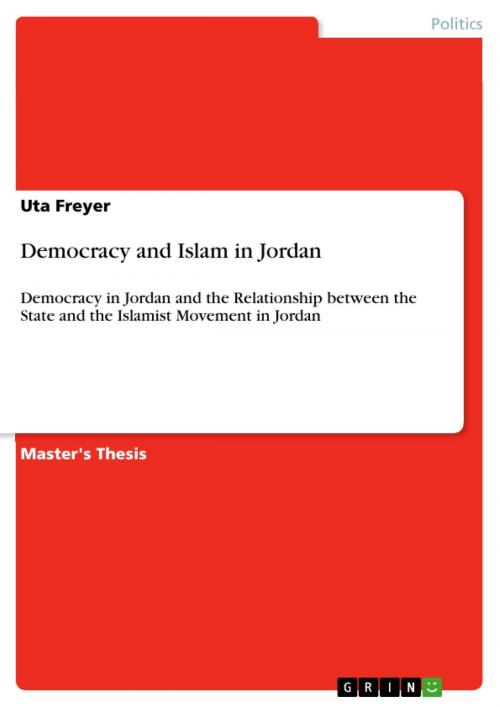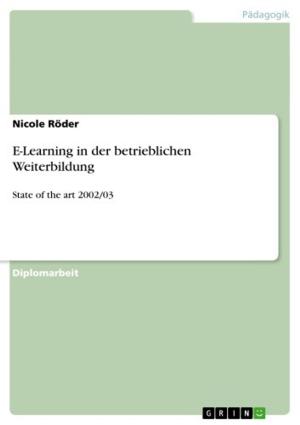Democracy and Islam in Jordan
Democracy in Jordan and the Relationship between the State and the Islamist Movement in Jordan
Nonfiction, Social & Cultural Studies, Political Science, International, International Security| Author: | Uta Freyer | ISBN: | 9783668463059 |
| Publisher: | GRIN Verlag | Publication: | June 13, 2017 |
| Imprint: | GRIN Verlag | Language: | English |
| Author: | Uta Freyer |
| ISBN: | 9783668463059 |
| Publisher: | GRIN Verlag |
| Publication: | June 13, 2017 |
| Imprint: | GRIN Verlag |
| Language: | English |
Master's Thesis from the year 2017 in the subject Politics - International Politics - Topic: Peace and Conflict Studies, Security, grade: 95 von 100, University of Haifa (Politics), course: Peacekeeping Operations, language: English, abstract: This graduation project examines the influences of Islamic powers on democracy in Jordan. The Middle East is in upheaval, especially the Arabic Spring has contributed to question and reorganize society structures. While democracy and human rights take an increasing role in the global context, this seems not to be the case in the Arabic World. In the case of Jordan, the country presents itself as a constitutional monarchy within a democratic system. The constitution guarantees Western liberal democratic freedoms. Anyhow, in practice, they are rarely implemented. The royal house strives to present the society as modern and democratic and pursues specific interests by that. Anyhow, examining the factors that define democracy, one has to raw the conclusion that society structures in Jordan are authoritarian and undemocratic. This paper examines the (un)democratic structures of Jordanian society while especially focusing on the Islamic groups in Jordan. It analyses the influence of the Muslim Brotherhood and their corresponding political party IAF (the biggest Islamic party in Jordan) in parliament, on political reforms, on the Arabic Spring, on the role of woman in society, on the account of middle class and on the relationship of the party towards the central government. By that, it is going to become clear that IAF and Muslim Brotherhood scarcely influence political reforms in Jordan. Also in the resistance movement of the Arabic Spring in Jordan, Islamic groups had only a marginal impact. The former cooperation of the IAF with the Hashemite regime, which was based on grounds of common interests, came to rest. Experts fear an escalation with a possible radicalization of Islamic powers. Endeavours to establish more democratic structures have been disrupted. It seems to be the most important challenge of the time of the entire Arabic World to take Islamic movements serious and to integrate them, while simultaneously pressing ahead with endeavours to democratize society.
https://www.linkedin.com/in/uta-freyer-800a3387/
Master's Thesis from the year 2017 in the subject Politics - International Politics - Topic: Peace and Conflict Studies, Security, grade: 95 von 100, University of Haifa (Politics), course: Peacekeeping Operations, language: English, abstract: This graduation project examines the influences of Islamic powers on democracy in Jordan. The Middle East is in upheaval, especially the Arabic Spring has contributed to question and reorganize society structures. While democracy and human rights take an increasing role in the global context, this seems not to be the case in the Arabic World. In the case of Jordan, the country presents itself as a constitutional monarchy within a democratic system. The constitution guarantees Western liberal democratic freedoms. Anyhow, in practice, they are rarely implemented. The royal house strives to present the society as modern and democratic and pursues specific interests by that. Anyhow, examining the factors that define democracy, one has to raw the conclusion that society structures in Jordan are authoritarian and undemocratic. This paper examines the (un)democratic structures of Jordanian society while especially focusing on the Islamic groups in Jordan. It analyses the influence of the Muslim Brotherhood and their corresponding political party IAF (the biggest Islamic party in Jordan) in parliament, on political reforms, on the Arabic Spring, on the role of woman in society, on the account of middle class and on the relationship of the party towards the central government. By that, it is going to become clear that IAF and Muslim Brotherhood scarcely influence political reforms in Jordan. Also in the resistance movement of the Arabic Spring in Jordan, Islamic groups had only a marginal impact. The former cooperation of the IAF with the Hashemite regime, which was based on grounds of common interests, came to rest. Experts fear an escalation with a possible radicalization of Islamic powers. Endeavours to establish more democratic structures have been disrupted. It seems to be the most important challenge of the time of the entire Arabic World to take Islamic movements serious and to integrate them, while simultaneously pressing ahead with endeavours to democratize society.
https://www.linkedin.com/in/uta-freyer-800a3387/















